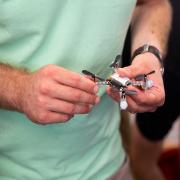M.Sc. in Environmental Engineering
The Environmental Engineering program aims to train environmental engineers capable of providing solutions for issues related to water contamination, renewable energy, soil remediation, solid waste and air pollution, and to develop technical solutions required for controlling or reducing pollution in ways that go hand in hand with legislation, economy, society and politics.
A high, wasteful standard of living generates environmental hazards and exploitation of resources. To prevent or at least reduce these hazards, a global effort is being made to increase the use of renewable sources of energy (sun, wind etc.), treat air pollutants, recycle municipal and industrial wastewater and remediate contaminated soils. Courses in the program are designed to equip students with knowledge and tools to address these global challenges. Students interested in R&D can write a thesis on a range of topics in Environmental Engineering, acquiring advanced research and experimentation skills. The program's graduates are employed in the growing field of environmental engineering, contributing to research and the development of new technologies, as well as the implementation of these technologies in industry.
Engineers from all areas of engineering or the exact sciences are invited to join the program and learn the underlying principles and how to use environmental tools, while acquiring an environmental way of thinking. Even graduates who do not ultimately work as environmental engineers, are well served by these tools in other fields of engineering (electrical, materials, chemical etc.).
Topics of study and research
The program includes a vast range of study and research topics: renewable energy (sun, wind, biofuels made of plant biomass and algae); energy storage; air pollution and controlling the emission of organic and inorganic pollutants and particles into the air; CO2 traps; technologies for converting waste into sustainable resources; environment with a focus on developing countries (India and Africa); treating municipal and industrial wastewater; treating water (ground, surface, brackish and marginal); recycling water and desalination of brackish and sea water; environmental nanotechnology (developing advanced materials for decontaminating water and air, and the environmental impact of nanomaterials); treatment and control of solid wastes; remediation of contaminated soils; separation processes based on mass transfer; risk assessment in industrial processes; risks of ionizing and non-ionizing radiation; dynamics of pollutants, waves and currents in the sea; turbulence in the atmosphere; contaminant transport in a porous medium, in ground and surface water and in the atmosphere; fuel transport (gas and liquid) and its environmental implications.
Laboratories
Marine Engineering and Physics Laboratory
Subsurface Reservoir Flow Laboratory
Water-tech Laboratory
Soil remediation
Biomimetic Mechanical Systems and Interfaces
Environmental Nanotechnology
Solar Energy
Macroalgea
Environmental Bioengineering
Employment opportunities
Today industry is required to meet increasingly demanding environmental standards. As a result, the demand for employees with a background in environmental engineering, able to provide solutions for these issues, in constantly growing, both in industry and in government agencies. Our graduates are employed in key managerial and operational positions in industry, in engineering and consultancy firms and in government and municipal agencies. Students in the research track may go on to a PhD degree, leading to a career in R&D and in academia.
Staff
Research students for advanced degrees are guided by the senior faculty members of the School of Mechanical Engineering involved directly or indirectly in various aspects of environmental engineering. Studies and research are sometimes interdisciplinary, and research may be conducted in collaboration with other departments in the Faculty of Engineering or elsewhere. The results of studies conducted by the students and their supervisors are usually published in papers, jointly submitted to international scientific journals.




